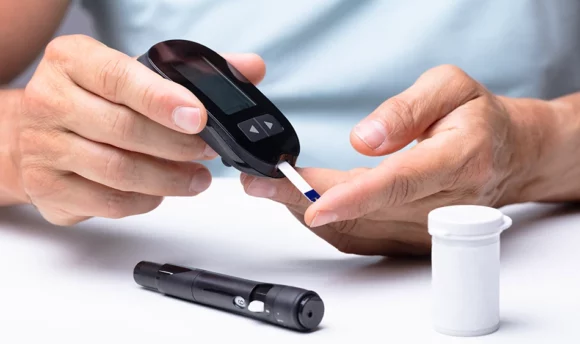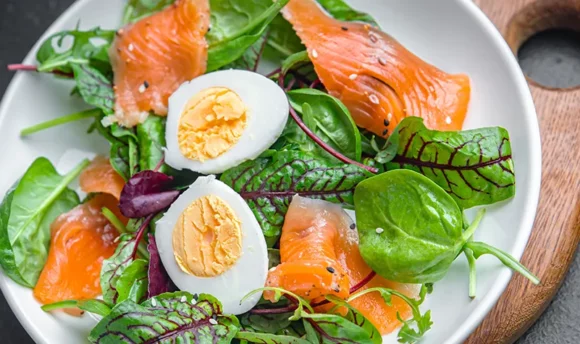In Ketosis but Not Losing Weight: 10 Possible Reasons Revealed
Ketosis encourages the body to burn fat stores, but what if you’re not losing any noticeable weight? There could be many factors that contribute to failed weight loss. We provide 10 reasons you might not be losing weight and 3 actionable tips for achieving your goals.

The ketogenic diet has many long-term health benefits.
You can have lower blood sugar levels, better concentration, and increased energy. One of the main reasons people eat low-carb foods is to lose weight.
So, it can be very annoying if you’re following the keto diet to achieve weight loss and aren’t noticing any changes. There could be several factors that contribute to this failed dietary routine. From certain medical conditions to eating processed foods, you’re bound to find the reason.
In this article, we provide 10 reasons you’re in ketosis but not burning fat.
In Ketosis but Not Losing Weight: Is It Possible?
Yes, it’s possible for you to be in ketosis and not lose weight. The body doesn’t automatically burn fat all the time, especially if you’re eating more calories. Even when you’re not losing weight, the keto diet can still strengthen your metabolic rate.
Some people might follow the keto diet and not see any noticeable weight loss. They could step on the scale and see the same number each week. You may find this disheartening and discouraging, but there are plenty of reasons why that number isn’t dropping.
Everyone has a different body and metabolism. For example, women are known to maintain weight loss better than men. Losing weight comes down to factors like gender, age, current body mass index, exercise routine, meal plans, sleep habits, and even genetics.
It’s also possible that your body is dipping in and out of ketosis. Eating junk food can stop the fat-burning process and hinder any weight loss results. Other things like alcohol, stress, and cheat days could also throw ketosis off course, so it’s worth keeping these factors in mind.
One thing to remember is that you burn dietary fat first. Being in a calorie deficit will encourage the body to burn stubborn weight once it’s gone through the digested food. You can burn an extra 300 calories when following the keto diet correctly and eating enough healthy meals.
What Is Ketosis?
Ketosis is a metabolic process that occurs when your body doesn’t have enough glycogen to burn. Your liver will then produce ketones – chemicals that give you energy. The body can start using fat stores to function properly and fuel important organs.
You can enter ketosis when eating low-carb foods, following intermittent fasting methods, or exercising regularly. The high levels of beta-hydroxybutyrate (BHB) in your blood will kickstart the fat-burning process, which focuses on burning visceral fat rather than carbohydrates.
People aim to consume fewer than 50 grams of carbs each day. This deprives the body of glucose and fuels ketone production. Once insulin levels decrease on the ketogenic diet, fatty acids are released from fat stores and travel to your liver to become ketone bodies.
10 Reasons You Might Not Be Losing Weight in Ketosis
There are many reasons people don’t lose weight on a low-carb diet. You could have meal plans that aren’t working or high-stress levels that slow down ketosis. Just remember that everyone’s weight loss journey is different, so don’t feel disheartened if you don’t see results straight away.
Here are 10 reasons you might not be losing fat in ketosis:
#1 You are eating too much
Consuming too many keto-friendly foods will exceed your daily calorie intake. People assume that because they have cut out carbohydrates, they can eat lots of other food to make up for it. Of course, in the long run, this slows down your progress and may cause future weight gain.
You should refrain from eating too many calories during the day. The body burns fat when you eat fewer calories and monitor your carb intake. This process might not be easy for everyone, especially if you get those dreaded hunger pangs after attempting the popular keto lifestyle.
#2 You are stressed and tired
Fatigue and stress are two surprising reasons for slow weight loss. You could be doing everything right, but those anxious thoughts are affecting you more than you think. For example, constant depressive episodes usually raise blood pressure and drain your energy levels.
No energy means you’ll be too tired to work out properly. Some research suggests that high blood pressure also promotes those extra pounds around your waist. This increased body weight can be challenging to deal with, but there are ways to manage your stress.
You can meditate, do deep breathing exercises, get more sleep, connect with friends, eat healthy foods, or take some time out when necessary. It’s very important to look after your body and learn effective relaxation techniques, even when you don’t feel like getting out of bed.
#3 You are eating processed foods
There are some keto-friendly processed foods that ruin your progress. People believe that eating salami, pepperoni, and bacon is perfectly fine on a ketogenic diet. These foods have minimal net carbs, but that doesn’t mean they’re healthy or suitable for long-term fat loss results.
Processed food is food that has been altered during the manufacturing process. Companies usually add highly refined oil, sugar, or salt to these products before packaging them. For example, breakfast cereals, sausages, tinned vegetables, biscuits, and sweet desserts all contain unhealthy ingredients.
The clean keto diet is the best way to lose weight and keep it off. You can eat clean foods that contain lots of vitamins and minerals. Instead of eating bacon with every meal, focus on consuming salmon, whole eggs, and even tuna to get a healthy source of high-fat protein meals.
#4 You are in the keto plateau
You might have reached the keto plateau – a metabolic state in which you burn fewer calories each day. This is common for most diets, so it’s nothing to worry about right now. Your body naturally slows down the metabolism as it gets used to digesting the same number of calories.
This can be a challenging process to overcome. You need to change things around, including your exercise intensity, calorie intake, and current diet plan. Some people restrict their calories even more to lose weight, which encourages the metabolism to start burning extra fat.
#5 You have a medical condition
There are certain health conditions that make you gain weight or stop you from losing any body fat. For example, hypothyroidism and Cushing syndrome may disrupt your future results. This is because they mess with hormones like thyroxine and cortisol, which weakens the metabolism.
You need to speak to a doctor before limiting your carbohydrate intake. A medical professional can offer advice about how to lose body fat safely using ketogenic diets. They might arrange an appointment with a registered dietitian – someone who focuses on healthy weight loss.
#6 You are not eating enough
Not eating enough could lead to nutritional deficiencies. You’re not consuming important nutrients that fuel the organs and keep you functioning properly. Signs of a deficiency include severe hair loss, bone and joint pain, fast heart rate, chronic fatigue, and muscle weakness.
A lack of calories encourages the body to hold onto fat and turn to the muscles for energy. In the long term, your metabolism will slow down significantly. People with a slow metabolism find it much harder to lose body fat, so never go below 1,500 calories when eating keto meals.
#7 You are eating too many low-carb treats
There’s nothing wrong with eating low-carb treats on a diet. Sometimes you need to treat yourself when overcoming intense sugar cravings. However, consuming too many of these snacks could increase your calorie intake, which may stop the body from burning fat.
To maintain ketosis over a few weeks, cut back on these treats or count how many calories you’re eating every day. Lots of keto dieters often forget about hidden carbs that eventually build up. You can only burn body fat once you consume the right amount of daily macros.
Use a keto calculator to find out how much protein, fats, and carbs you need to stay in ketosis.
#8 You are using too many sweeteners
Certain sweeteners can throw you out of ketosis completely. You should only choose sweeteners with no calories, net carbs, and preservatives. The best products score low on the glycemic index scale, meaning they won’t spike insulin levels and slow down weight loss.
Some great sweeteners include stevia, sucralose, erythritol, xylitol, and monk fruit. They are made using natural ingredients that keep insulin and blood sugar levels low. Just avoid products like honey and maple syrup, as they will quickly ruin the ketosis state.
#9 You are not counting macros
Counting your macros is one way to lose more weight. Eating the right amount for each category ensures you make better food choices and fuel your body with nutrients.
You should check the nutritional label of each product before buying. This means you’re not accidentally consuming too many carbs on a diet. Always be careful of certain protein-rich foods, as some of them contain saturated fat that could contribute to stubborn body fat.
#10 You are drinking alcohol
There are keto-friendly drinks, but that doesn’t mean they’re good for weight loss. Alcoholic beverages that contain zero carbs will still raise your insulin levels. This is because they are made using artificial sweeteners – synthetic sugars that aren’t suitable for ketogenic diets.
How to Lose Weight in Ketosis? 3 Actionable Tips
Losing weight on keto doesn’t have to be a challenging task. There are several tips that could boost your long-term results. Don’t forget that your body is unique and might react differently to weight loss, so take your time on this journey and try new things to burn that stubborn fat.
Keep reading to find 3 tips to help you lose weight:
#1 Count macros and daily calories
To stay in ketosis, you need to count your calories and macros. This should become a daily habit, especially when tracking your eating. You need your phone to calculate calories and measure grams of protein, fats, and total carbohydrates in each meal.
Being aware of your calorie intake will also help you understand if you’re in a calorie deficit that could speed up the weight loss process.
#2 Try intermittent fasting
Intermittent fasting is an eating pattern that cycles between eating windows and fasting periods.
This means you would fast for 16 hours and eat in the remaining 8-hour window. However, there are other types of fasts that could benefit your weight loss progress. For example, the 12-hour fast is great for beginners, as you can split the time equally between eating and fasting.
The idea of intermittent fasting is that it’s supposed to help you burn body fat. During the fast, you’re not consuming any calories, which strengthens your metabolism in the long term. Of course, a fast metabolism means you’re burning more calories throughout the day.
If you do want to try fasting, always increase your daily fat intake. This ensures you have enough energy outside of the eating window. High-fat foods like avocados, coconut oil, grass-fed butter, salmon, olives, pistachios, and flax seeds may help reduce stubborn belly fat.
#3 Experiment
There are several ways you can experiment while in ketosis.
Some people exercise more to burn those extra calories during the day. You could go for a long-distance run or walk to get your heart pumping. Cardio-based exercise is known to cause weight loss and decrease the risk of heart disease, obesity, and blood clots in the heart.
Eating a range of fat-based foods in each meal can boost your results. The body needs this energy source to eliminate more body fat. It’s recommended that you get 70–80% of fat from your daily calories, as this is enough to strengthen the metabolism and reduce body weight.
A Word From a Nutritionist
People can follow ketogenic diets to feel healthy and lose some visceral fat. This type of fat wraps around your organs and stops muscle definition from peeking through. However, eating minimal carbs in your diet could get rid of that fat and tone your body at the same time.
Just remember that consuming too few calories or too many processed foods can hinder your long-term results. Saturated fat is the hidden ingredient that contributes to weight gain. To avoid these foods, check each product’s label and evaluate the content of macronutrients.
Of course, you don’t have to follow keto diets just to lose weight. Some other health benefits include stronger brain function, improved heart health, acne-free skin, and lower blood pressure. These benefits naturally boost your mental and physical health in the long term.
Conclusion
You don’t have to worry about the sudden drop in your fat loss results. Following keto means people should experiment and find what works for their bodies. Simple reasons like too much protein or lack of exercise could easily be fixed when you’re determined to lose that weight.

















































 Select your language:
Select your language: 








